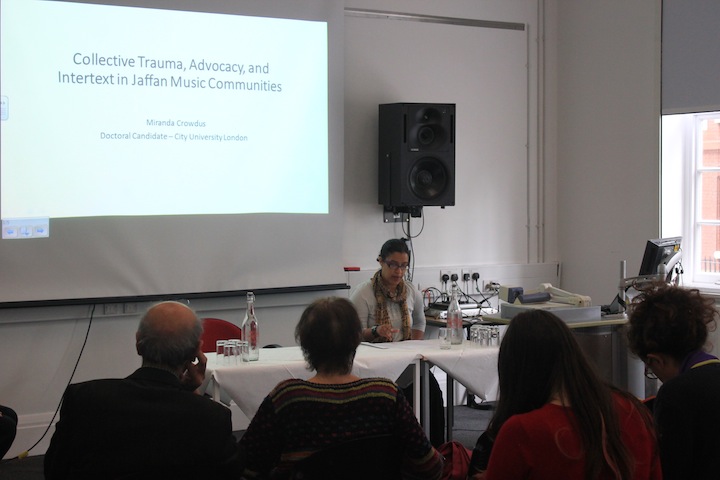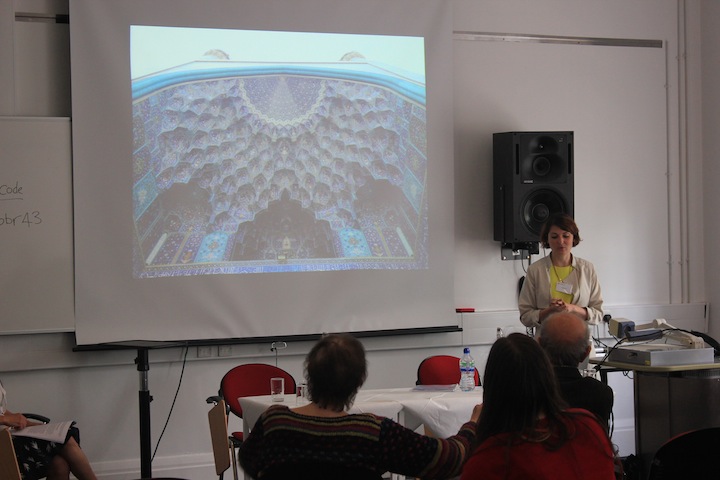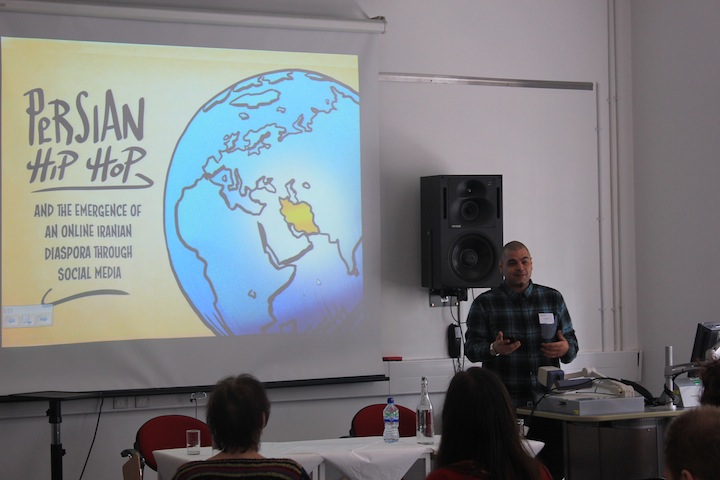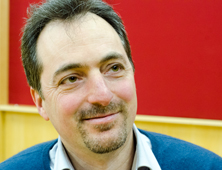The City University Symphony Orchestra’s final concert for the year (Friday May 23rd, at LSO St Luke’s) has received a glowing review on Classical Source, drawing particular attention to DMA candidate Ben Schoeman’s performance as soloist in Saint-Saëns’ ‘Egyptian’ Concerto. The full review can be found here.
Monthly Archives: May 2014
Middle East and Central Asia Music Forum
The Middle East and Central Asia Music Forum took place at City University London on Tuesday May 20th 2014. The forum has been running as part of the Institute of Musical Research since 2007 and is open to researchers, students and anyone interested in the music and culture of the region. The forum provides a space for both students and more experienced researchers to present their current research in a relatively informal context.
The event was well attended with about 35 visitors, and 9 speakers from the UK and abroad presented papers on a range of musics across the region, The day began with a panel on music and conflict resolution in Israel/Palestine with speakers Antonia Baum (PhD student, SOAS) and Miranda Crowdus (PhD student, City) presenting papers entitled ‘Practising Play and Moving in Time: Musical Performances at an Israeli-Palestinian Reconciliation Gathering’ and ‘Collective Trauma, Advocacy, and Intertext in Jaffan Music Communities’.
The second morning session focused on Iran, starting with Iranian-British composer Soosan Lolavar (Trinity Laban Conservatoire of Music and Dance) talking about her recent project ‘Stay Close’ in which she collaborated with British and Middle Eastern musicians as well as running workshops in an Iranian youth centre in south-east London. The last speaker of the morning, Mehryar Golestani (aka Reveal; MMus student, SOAS), a well-known British-Iranian rapper, presented a paper on ‘Persian Hip-Hop and the Emergence of an Online Iranian Diaspora’.
The afternoon included a screening of the film Music of the Uzbeks of Northern Afghanistan, by Razia Sultanova , followed by Edward Fox (Open University) talking about the Sowt al-Khaleej music that he encountered and recorded on a recent trip to Oman. Eliot Bates (University of Birmingham) then talked about Doğa İçin Çal (literally ‘play for nature’), a 2011 Turkish crowd-sourced video series featuring hundreds of amateur and professional musicians ostensibly playing or singing for environmentalism. Through a discussion of this video series, Bates presented a reassessment of the ninety-year history of state-sponsored folklore in Turkey, and the fifty-year history of Unkapanı, the heart of the music industry located in Istanbul.
For the final session of the day, we welcomed Joseph Alagha from Haigazian University, Lebanon, talking about the use of music by Hizbullah in Lebanon (“‘Resistance Art’ as Soft Power: Hizbullah’s Music Bands”) and in the last paper of the day Stefan Williamson Fa (SOAS/The Sayat Nova Project) discussed some of the current trends in Islamic musical practice in the Northeastern Caucasus, drawing on recent fieldwork amongst Dagestani and Chechen communities in Georgia and Azerbaijan.
The day ended with a concert in the performance space – ‘Stay Close: Only Sound Remains’ – showcasing work from Soosan Lolavar’s Stay Close Contemporary Music Project.
Links:
http://www.staycloseproject.com/
http://music.sas.ac.uk/research-networks/middle-east-and-central-asia-music-forum
http://www.bbc.co.uk/news/entertainment-arts-27439043
Middle East and Central Asia Music Forum, Schedule and Abstracts (20.5.14)
Five minutes with: Ed Fish (CUEE)
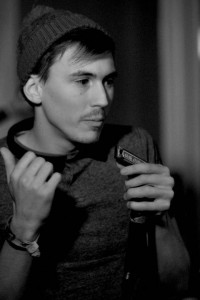 Ed Fish is a final year student at City University London and one of the founding members of City University Experimental Ensemble. We took a few minutes to talk to him about CUEE ahead of their concert at City Summer Sounds.
Ed Fish is a final year student at City University London and one of the founding members of City University Experimental Ensemble. We took a few minutes to talk to him about CUEE ahead of their concert at City Summer Sounds.What is City University Experimental Ensemble and why did it form?
CUEE is a student led ensemble who compose and perform new, improvised, conceptual and avant-garde music. The ensemble formed through a collective desire to play music that would expand our horizons and perhaps challenge our preconceived notions of what musical performance and composition should be. It also acts as a platform to discuss and try out new ideas in a friendly and welcoming environment.
One of the great things about the ensemble is the collaborative nature that seems to exist, and especially amongst performers/composers of very different backgrounds. Was this always the intention of the ensemble and is it integral to the music you perform?
I would say it is pretty integral. Some of our members are classically trained musicians or come from jazz, latin or pop backgrounds whilst others are computer musicians and scientists. I think that this diversity makes for a richer creative environment and allows us a variety of perspectives when we approach a piece or discuss an idea. We have always been completely indiscriminate as to who can join the ensemble and for us a curious mind is more useful than an ABRSM qualification. That’s not to say that some of the music we perform isn’t challenging though, but the challenge may be learning to echolocate, keeping rhythm on a teacup or interpreting a graphic score.
You recently performed works by James Saunders with Plus-Minus and James himself, and you will be performing Saunders’ everybody do this in tomorrow’s concert. How was that experience, and what is it about his music that you are drawn to?
The concert was a great opportunity for us to work with a professional composer and ensemble as well as getting a bonus session with composer Matthew Shlomowitz. I think I was a little surprised by how friendly everyone was and how interested James was to hear our ideas on the piece and our interpretations. The performance of everybody do this was fun but pretty hectic with so many musicians on the stage so I am looking forward to performing it with a smaller group in the next concert to see how it affects the way that the piece unfolds. Perhaps people who may have been less dominant in a larger ensemble may become more confident in a smaller group or vice versa. I think I am drawn to Saunders’ work because of the experimental nature of his music and its ability to explore interesting ideas with relatively basic indeterminate structures. For example the performance instructions for everybody do this are very simple but, when performed, the piece raises interesting questions about group dynamics and social structures. I was surprised watching the performance of the last concert how much of a loudmouth I was so I guess I have learnt something about myself in the process too. Maybe I will try to keep it down a bit this time.
You can see the recent performance of everybody do this, performed by City University Experimental Ensemble, Materials and Plus Minus here.
On a more personal note, you graduate this year and begin your journey into pastures new. Where do you hope to be musically in 5 years time?
Fingers crossed I can get on a masters course and explore composition at a deeper level. I think my compositional output at the moment suffers from a lack of knowledge about existing practice, especially in new music and so over the next few years I am going to invest heavily in exploring existing works. It’s another reason why it’s so good to be a part of CUEE. I think the best way to learn about new music is to perform it. In five years I would hope to have a few pieces under my belt and have a clearer idea of how I define myself as a composer.
And finally, what’s next for CUEE?
We should be getting a new batch of recruits next year and hopefully with that will come new music and new ideas to explore. Thanks to Newton Armstrong and Diana Salazar we have been put in touch with some exciting new composers and performers so we will aim to develop these relationships as we make the transition towards becoming a professional ensemble.
City University Experimental Ensemble perform as part of City Summer Sounds festival on Wednesday 28th, 1.10pm in the Performance Space, College Building.
Admission is free
http://www.city.ac.uk/events/2014/may/lunchtime-concert-city-university-experimental-ensemble
Or follow us on facebook and twitter:
http://facebook.com/CityUniConcerts
http://facebook.com/CitySummerSounds
http://twitter.com/CityUniConcerts
Ben Schoeman (DMA) performs with the Cape Town Philharmonic Orchestra and at Carnegie Hall in New York
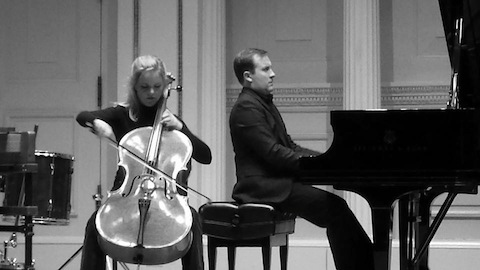 On 24 April, pianist and DMA student Ben Schoeman performed the Piano Concerto no. 5 by Camille Saint-Saëns with the Cape Philharmonic Orchestra in the Cape Town City Hall. This concert was part of the CPO’s centenary celebrations and Schoeman performed under the baton of fellow South African Pieter Daniel. The concert received outstanding reviews in the local press and the critic Pieter Kooij wrote: “Ben Schoeman’s beautiful interpretation of the Fifth Piano Concerto by Saint-Saëns was a feast of virtuosity. However, delicate playing and sparkle, typical aspects of Saint-Saëns’ music, were also brilliantly achieved … the audience in the packed City Hall rewarded him with a loud and standing ovation” (Die Burger, 26 April 2014).
On 24 April, pianist and DMA student Ben Schoeman performed the Piano Concerto no. 5 by Camille Saint-Saëns with the Cape Philharmonic Orchestra in the Cape Town City Hall. This concert was part of the CPO’s centenary celebrations and Schoeman performed under the baton of fellow South African Pieter Daniel. The concert received outstanding reviews in the local press and the critic Pieter Kooij wrote: “Ben Schoeman’s beautiful interpretation of the Fifth Piano Concerto by Saint-Saëns was a feast of virtuosity. However, delicate playing and sparkle, typical aspects of Saint-Saëns’ music, were also brilliantly achieved … the audience in the packed City Hall rewarded him with a loud and standing ovation” (Die Burger, 26 April 2014).
A few weeks later Schoeman joined his duo partner, the cellist Anzél Gerber, in a successful performance at the Weill Recital Hall of Carnegie Hall in New York. The concert was part of the duo’s first prize in the 2012 Ibla Grand Prize Competition in Ragusa-Ibla, Italy. Ben and Anzél are also embarking on an extended tour of South Africa and Namibia in 2015.
On Friday 23 May 2014, Ben Schoeman will perform the Saint- Saëns Concerto no. 5 with the City University Symphony Orchestra and conductor Anthony Weeden at LSO St. Luke’s. The concert starts at 19:30 and tickets are available on the LSO St. Luke’s website: http://lso.co.uk/145/City-University-Symphony-Orchestra/1048
Dr Shay Loya receives the Alan Walker Book Award
Dr Shay Loya has been named as recipient of the prestigious Alan Walker Book Award, a prize funded by the American Liszt Society. Loya’s book Liszt’s Transcultural Modernism and the Hungarian-Gypsy Tradition was chosen from eight monographs submitted for consideration. Michael Short was co-winner of the award for his translation of Correspondence of Franz Liszt and the Comtesse Marie d’Agoult.
Alexander Karpeyev curates Medtner Day at the Guildhall School of Music and Drama
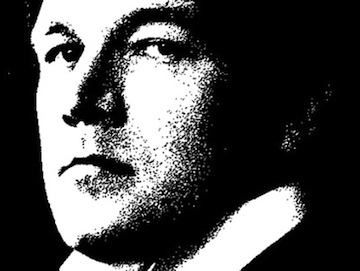 On Thursday 22nd of May, Medtner Day, the first in the UK one-day long festival dedicated to the artistic output of Russian pianist-composer Nikolay Medtner will take place. Musicians from Guildhall School of Music and Drama will be performing solo piano works, songs and chamber music by this enigmatic composer. Having lived in England for the last 16 years of his life, Medtner was well known in the UK through his performances at the Proms and his recordings for the BBC and HMV. The underlying idea of Medtner Day in 2014 is to bring the attention of modern day audiences back to this outstanding artist.
On Thursday 22nd of May, Medtner Day, the first in the UK one-day long festival dedicated to the artistic output of Russian pianist-composer Nikolay Medtner will take place. Musicians from Guildhall School of Music and Drama will be performing solo piano works, songs and chamber music by this enigmatic composer. Having lived in England for the last 16 years of his life, Medtner was well known in the UK through his performances at the Proms and his recordings for the BBC and HMV. The underlying idea of Medtner Day in 2014 is to bring the attention of modern day audiences back to this outstanding artist.
The programme for the Day:
1pm – lunchtime concert
3pm – masterclass by Hamish Milne (RAM)
5:45pm – pre-concert talk by Francis Pott (University of West London)
7pm – evening concert (to include Piano Quintet, Sonata tragica, selection of Tales, songs and Russian Round Dance for two pianos).
Admission is free and no tickets are required. This event is curated by City University DMA student Alexander Karpeyev whose research focuses on performance practise in Medtner. Further information is available here.
Alumnus Interview: Luke Shrewsbury
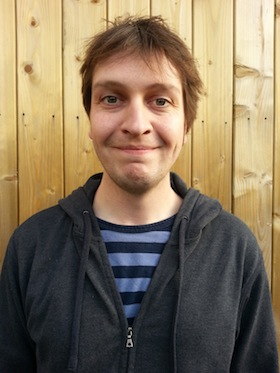 When did you graduate from City and what have you been doing since?
When did you graduate from City and what have you been doing since?
I graduated from City in 2009. I had really enjoyed a huge range of specialisms at City but I had particularly enjoyed Ethnomusicology and Electroacoustic Composition. I’d done a lot of work in ethnomusicology on the social role of music in different ethnic communities living in London and had discovered a passion for talking to musicians and recording sounds/instruments, as well as experiencing other areas of new cultures (mostly food!). Alongside this I was very dedicated to Electroacoustic composition and the manipulation of sounds using new technologies. I became interested in recording, field recording and music recording. The department really ignited this crossover between ethnomusicology and music technology and after I graduated I began using my recording skills to do little jobs in film and documentary. As my passion grew I was briefly involved at Resonance FM and then for a short while I worked at a community radio station in my hometown of Sheffield as well as doing some jobs for BBC radio. I worked on various low-budget short films and sometimes some mid-budget ones throughout this time. I was developing a love for telling stories in sound. This involved music, field recordings and voices and it was a natural progression to pursue this at a more professional level into the world of film and TV where having not only a musical ear, but an ear for a good story and how to tell it is crucial. And naturally, I had been interested in cinema, television and drama for many years. provides a great space to combine a technical interest in technology with the desire to create something more abstract that has emotional content.
I gather you’ve just finished a course at the National Film and Television School. Can you tell us about the course and what you enjoyed most/got the most out of?
The National Film and Television School is a place that nurtured my creative passion and taught me update technical to enter the world of film sound. Its an old institution and the MA course I did there was incredibly exciting and taught me everything about proffessional sound that I know. The School operates as a replica film studio with films being produced, shot and post-produced year round. I worked on various fiction, animation and documentary projects over two years using industry-standard facilities and with visiting tutors who work in film and television.
I had access to very good technology, and very good teaching. It’s very intense – more like a job in post-production facility than a degree course. It also allowed me to become more creative with my field recording, interacting with film makers, mixing and editing sounds. Building on all the things from my undergraduate degree at City University and allowing me to develop myself creatively and technically.
Where are you working now? Can you tell us what your work involves and what you enjoy the most.
I’m currently working on several projects. I’m employed as an assistant sound editor by a production company making a children’s animation series due for broadcast this year on CBeebies. I edit dialogue for them in an office in Camden.
I’m also working on two short films, one is a comedy produced by some friends of mine who hope to get a pilot commissioned for television and the other is a short drama with no dialogue – so I’m having a lot of fun creating atmospheres and recording foleys and Sound FX. Because there’s no dialogue I can be very precise about how a scene sounds because I can replace everything very easily without the need to do expensive voice re-recording.
The other area of work that has opened up is sound design for Video Games. Its a huge industry and its ever-expanding. there are hundreds of indie games out there and they all need creative sound designers to help them out. I’m currently working in development with a small team who have been commissioned by the Wellcome Trust to produce an education science app.
Projects large and small keep getting thrown my way and thats what I enjoy about the job most. I get to meet a huge range of people from a range of disciplines and backgrounds and help them realise their projects using sound and music.
Where do you see yourself in 5 years time? What would your ideal job be?
Right now, as long as the work keeps coming, I’m in an ideal place. I’d like to work on larger feature films and also develop my sound ideas as installations. I love recording and editing sounds so I hope to be doing that in 5 years time.

